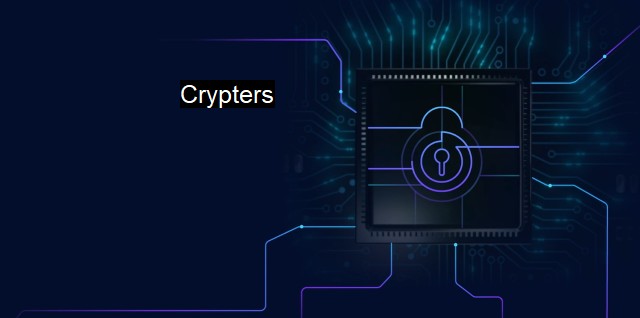What are Crypters?
Crypters: The Double-Edged Sword of Cybersecurity - Exploring the Critical Role of Crypters in Malware Encryption and Defense
Crypters occupy a peculiar but powerful niche within cybersecurity. Simply put, crypters are tools or software programs used by hackers or cybercriminals to disguise, cloak or entirely hide malicious entities such as viruses, worms, Trojan horses, and other forms of malware to bypass or evade antivirus security defenses. To understand their role in detail, you need to contemplate the digital chess game of cybersecurity.Fundamentally, antivirus software's principal function is to safeguard computers and digital devices from malware or other forms of intrusive software. These programs critically scan computers and networks for potential threats, either quarantining or eliminating them based on their algorithms.
As antiviruses grow more advanced, so do the strategies of the cybercriminals who create and widely disseminate these hazardous software elements. This relentless march has given birth to crypters, programs designed to obfuscate the code of a material, natural or malicious, making it almost undetectable to antiviruses. This can allow intrusive applications like keyloggers, spyware, rootkits without a security protocol that can identify them, to freely permeate a digital system, undeterred and undetected.
Basically, crypters operate by encrypting malicious code using complex algorithms that the traditional antiviruses often can't decrypt. This exercise transforms the appearance and structure of the code, making it unrecognizable and elusive for security software. The malicious code lays dormant hence undetectable, at least until it infiltrates the target and starts executing its damnable function.
Crypters don't necessarily have malicious intent on their own. Their origins can be traced back to legitimate uses for testing the rage and strength of antiviruses. They serve as a litmus test for these defense mechanisms, ensuring that they stay on the offensive against evolving viruses. hackers soon found a gradient for perversion, shaping these tools as malevolent weapons for digital assaults.
In modern usage, there are two categories of crypters: the legitimate ones also termed "white-crypters" and the illicit ones named "black-crypters". The distinction is primarily owed to their intention. As previously mentioned, white-crypters are deployed by cybersecurity experts or firms to test the potency of antiviruses. Conversely, black-crypters are manipulated by malicious entities to bypass and mislead securities.
Considering the expansive range of crypters, choosing the profitable “black” side brings riffles of illicit earnings for hackers. Commercial crypters have emerged as significant tools in the black market of the dark-web where they are bought and sold at tremendous prices.
Notwithstanding their use, crypters significantly impact the burgeoning field of cybersecurity. The reliance on encryption and other disguising tactics pressurize the cybersecurity industry to evolve, invent sturdier defenses, upgrade their machinery, and cultivate better prevention mechanisms. With the advent of new-age technologies like machine learning and artificial intelligence, already transforming security paradigms, the future promises deracinating endeavours against crypters.
Crypters remain a double-edged sword in the cybersecurity world. On the one side, they propel advancements and help construct better fortifications and on the contrary, constitute potential sources of vast digital vulnerability. Their existence keeps us acutely aware of the evolving and dynamic nature of cyber threat landscapes and the need for ever-adapting cybersecurity strategies, ensuring an intense and unending siege that characterizes the cyber battleground.

Crypters FAQs
What is a crypter?
A crypter is a type of software that is used to hide the true contents of a file from detection by antivirus programs. It works by encrypting the file in such a way that antivirus software is unable to detect and identify the malicious code withinAre crypters legal?
Crypters themselves are not illegal, as they can be used for legitimate purposes such as protecting confidential data. However, using crypters to hide malware or viruses from antivirus software is illegal and can result in serious consequencesHow can crypters be detected by antivirus software?
Antivirus software can detect crypters by using certain heuristics and behavioral analysis. They can look for suspicious encryption patterns or attempts to evade detection by modifying the file's metadata. Additionally, antivirus companies maintain extensive databases of known malware and crypters that they use to identify potential threatsCan crypters be used to bypass firewalls?
Crypters can potentially be used to bypass certain types of firewalls, but it depends on the specific firewall software and its configuration. In general, using a crypter alone is not likely to bypass a well-configured firewall, as firewall software is designed to block or allow traffic based on a variety of factors, such as source and destination IP addresses or ports usedRelated Topics
Malware protection Cyber attacks Encryption algorithms Cybercrime Anti-virus software
| | A | | | B | | | C | | | D | | | E | | | F | | | G | | | H | | | I | | | J | | | K | | | L | | | M | |
| | N | | | O | | | P | | | Q | | | R | | | S | | | T | | | U | | | V | | | W | | | X | | | Y | | | Z | |
| | 1 | | | 2 | | | 3 | | | 4 | | | 7 | | | 8 | | |||||||